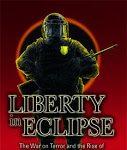Monday, August 18, 2008
Back In the USSA
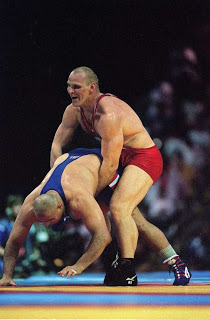 In his prime he was the most dominant wrestler since the semi-mythical Milo of Croton. A terrifying, 6’4″ mound of sharply defined muscle mass, three-time Russian gold medal winner Alexander Karelin typically sported a tonsured head that was as blunt as an artillery shell and an impavid glare as frigid as mid-winter in his native Novosibirsk.
In his prime he was the most dominant wrestler since the semi-mythical Milo of Croton. A terrifying, 6’4″ mound of sharply defined muscle mass, three-time Russian gold medal winner Alexander Karelin typically sported a tonsured head that was as blunt as an artillery shell and an impavid glare as frigid as mid-winter in his native Novosibirsk.
His sheer size, as well as the game face he brought a match, were often often sufficient to terrify competitors into submission even before they tied up on the mat.
His physique was deceptive; he appeared bulky and smooth, perhaps even a little flabby, while warming up. This sometimes engendered fleeting hope that he might be a little soft, a little slow.When competitive exertion began, however, dense plateaus of muscle would suddenly reveal themselves in Karelin’s chest and upper thighs, sharp striations of sinew would etch themselves in his arms, and his opponent would learn that Karelin’s strength was entirely functional — and utterly inhuman. They would likewise discover that he had the agility of a much smaller athlete, as well as the flexibility of a gymnast.
Much of Karelin’s training was derived from his upbringing in one of Russia’s most pitiless regions. One of his preferred training protocols was to run uphill sprints through chest-high snowdrifts; to increase the difficulty he would often carry a large log on his shoulders. He also spent countless hours hiking, hunting, skiing, and rowing a boat in the wilderness.
By the time he became an Olympic athlete Karelin was already a world-class physical specimen.
Between 1987 and 2000 (when he was beaten in Sydney by the heroic Rulon Gardner), Karelin never lost a match, and never surrendered a point, in international competition. Many of his opponents, unable to mount an offense, focused instead on trying to prevent Karelin from executing his signature scoring move — the “Karelin Lift.”Derived from a move generally used by much smaller Greco-Roman grapplers, the Lift involved securing a body-lock on the opponent and then lifting him from the mat and dropping him on his head. Bear in mind that Karelin, who competed in the 286-pound weight class, was executing that maneuver on world-class competitors who weighed roughly as much as he did.
When he was approached in 1999 to run for parliament as a member of Vladimir Putin’s Unity Party, Karelin — regarded as a national hero by the Russians, who as a truly civilized people have a proper esteem for wrestling, the purest sport — was told he would have to grow his hair and otherwise soften his terrifying visage. “Maybe you want me to pierce my ears and nose, paint my cheeks, use lipstick and makeup?” Karelin growled at his image-maker, who quite likely found himself involuntarily irrigating his skivvies.
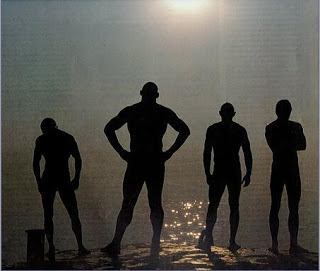
Even though he appeared to be an authentic Ivan Drago, a product of a super-secret Soviet genetic engineering project (hence his nickname “The Experiment”), Karelin is literate and refined man.
He has steeped himself in the admirable literature and exquisite classical music of his homeland, to which he has a deeply rooted devotion. Like many Russians of his generation, however, his is a somewhat paradoxical patriotism.
For most of his life, his country was run by undisguised criminals who strip-mined it of its wealth, both tangible and cultural; who filled mass graves with tens of millions of innocent victims, and ran the world’s largest network of prison camps; and who ruled through terror at home while pursuing subversion, and aggression abroad.
After winning his first gold medal in Seoul in 1988, Karelin acquired the cultural clout to defy the Soviet Communist Party, at a time when such defiance was still a very risky proposition. Shortly thereafter he asked his mother to renounce her Party membership, which she did.
Karelin’s study of Solzhenitsyn’s work had taught him, quite properly, to loathe Communism, but it left him hurting and puzzled: “[A] lot inside me was ruined by trusting in the society where I live. After reading this, I had nothing left. I wondered, Are there no white spots in our history, only black? My whole country is in perpetual funeral.”
Patriots of many countries, our own emphatically included, can empathize with Karelin. It is natural to love one’s country. It is just as natural for informed people to despise the government that rules them. Many Russian patriots who became politically aware shortly before the end of the Soviet Union were put into an exceptionally painful position: As much as they loved their country, they couldn’t feel proud of it.
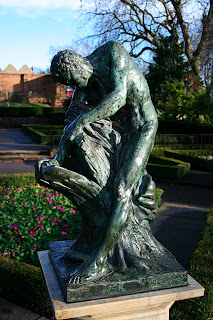
That’s the predicament confronting well-informed, principled patriots living in the proto-Soviet USA. Please forgive me for quoting something I wrote several years ago — a column for The New American magazine that was rejected by its timorous editor and publisher for being a touch too controversial.
At the time, George Bush the Lesser, purported conqueror of Mesopotamia, was still in high triumphalist mode. He was still wreathed in the institutionalized awe of an official personality cult, and it struck me at the time that Bush had more than a little in common with Russian President Vladimir Putin.
Both had come to power as the result of appointment, rather than election. Both benefited from high-profile terrorist attacks the following September — in Russia, it was a series of apartment bombings; in the US, of course, it was 9/11. Each of them used those incidents as a pretext to resume a highly controversial war — Chechnya for Putin, Iraq for Bush.
Each worked quickly to centralize power in the office of the chief executive, and to expand the use of surveillance, extra-judicial detention, and torture. Both of them practiced shameless cronyism, and cultivated a quasi-official “Dear Leader” cult. For all of these similarities, I concluded, the comparison between Bush and Putin is fundamentally unfair, since “one of them heads an increasingly authoritarian and lawless government that is pursuing a radical vision of global revolution rooted in the teachings of the Soviet Union’s founders. The other is merely the president of the Russian Federation.”
The unpalatable reality of our present circumstances is this: Putin’s Russia, in domestic terms, still displays many of the traits of its Soviet past — but it is the regime in Washington that is carrying out a truly Soviet-style foreign policy. Moscow doesn’t seek to build an ideological empire run by a vast army of apparatchiks and puppet rulers. Washington manifestly does.
This is apparent in the ugly war that Washington arranged in Georgia, a country run by a visibly unbalanced tool of the neo-“conservative” politburo. Mikheil Saakashvili was brought to power in 2003 through a coup orchestrated by the National Endowment for Democracy, often referred to as the “Neo-conservative Comintern.” Georgia’s “Rose Revolution” was one of a series of color-coded “revolutions” that roiled various countries in recent years — Lebanon’s “Cedar Revolution,” the Ukrainian “Orange Revolution,” and the “Tulip Revolution” in Krgyzstan.
Georgia’s “Rose Revolution,” observes Peter Hitchens of the London Daily Mail, “was a putsch achieved by an orchestrated mob, followed by an election so shamelessly one-sided that our supposed hero got 96 per cent of the vote.”
That figure reminded me of the “Tirana Index,” devised about two decades ago by Charles Krauthammer, who at the time was a mildly innovative commentator at The New Republic. Alluding to the fact that Albania’s ruler Enver Hoxha, an unvarnished Stalinist, routinely “won” elections by majorities of 99 percent or higher, Krauthammer asserted: “The higher the vote any government wins in an election, the more tyrannical it is.”
That was how Dr. Krauthammer saw things circa 1986.
Today — well, last Friday (August 15), when his most recent column was published — Krauthammer, who has degenerated into a tediously predictable neo-con hack, extols the Georgian regime as “Georgia’s democratically elected government,” even though by his own Tirana Index Georgia would have to be classified as a despotism.
The recent behavior of Saakashvili’s junta — ruling through a state of emergency at home, and engaging in blatant aggression abroad — certainly illustrate that Krauthammer was on to something with his Index.
No matter, he insists: Should Saakashvili’s government fall because of an ill-conceived effort (abetted by Washington and Tel Aviv) to force unwilling ethnic Russians to submit to its rule, then we must be ready to “make Russia bleed.” This is to be done first through international ostracism, and then by supporting an Afghan-style armed resistance movement, if necessary.
Hey, great idea, Chuck, given that, y’know, Washington’s last venture in Afghan-style proxy warfare was such an unqualified success.
Last March, the Bush administration made it known that it supported Georgia’s request to join NATO — as soon as it dealt with the problem of ethnic separatism in South Ossetia and Abkhazia. The correct way to deal with separatism, of course, is to respect the right of people to go their separate ways if they choose to, and then to conduct commerce and diplomacy on peaceful, honorable terms.
That’s the correct way. It is not, however, the “American” way, at least since 1861.
It’s certainly not what Saakashvili — whose political base consists of Georgians who want to reclaim South Ossetia and Abkhazia — had in mind.
And this is obviously not what Washington had in mind when it dispatched hundreds of military advisers to Georgia, conducted war games with the Georgian military that ended just a week prior to the assault on South Ossetia, and (with the help of Israeli contractors) equipped the Georgian Army for an attack that Washington certainly knew was coming — just as it certainly knew Russian reprisals would not be far behind. 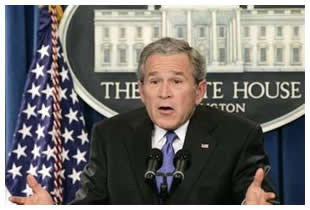
I have no way of knowing if Washington expected the Georgian military to collapse under the Russian onslaught as quickly and completely as it did. Since the Georgia gambit was planned by the same strategic geniuses who assured us that American occupation forces in Iraq would be greeted with candy and flowers, I suspect the result was an unpleasant surprise.
While neither side in this conflict is entirely clean, it was the post-Soviet Russian military that acted with professionalism, efficiency, and, for the most part, proportionality; it was the Georgian forces trained and equipped by the proto-Soviet regime in Washington that committed an act of undisguised aggression, and — when stymied by a superior force — channeled its murderous rage into attacks on innocent civilians. And in a moment of unabashed censorship worthy of Soviet state television, Fox “News,” an acknowledged appendage of the White House, actually tried to suppress eyewitness testimony of American civilians who reported that the Georgians had been the aggressors, and the Russians had acted to protect civilians.
After abetting Georgian aggression before the fact, and intervening during the ensuing hostilities (by airlifting Georgian troops from Iraq and dispatching military “humanitarian aid” missions), Bush retained the unmitigated gall to insist that the Russians had to honor Georgia’s version of its international boundaries: “A major issue is Russia’s contention that the regions of South Ossetia and Abkhazia may not be a part of Georgia’s future. But these regions are a part of Georgia. There’s no room for debate on this matter.”
Leaving aside the fact that the U.S. has no right or need to be policing ethnic boundaries in the Trans-Caucasus, Bush is missing a point that should be obvious even to him: His puppet regime lost the battle; it was the side that requested a cease-fire; and the losing side doesn’t get to dictate what can and cannot be debated.
Clearly, Bush and the adults who script his lines aren’t finished with the Georgian conflict, and they’re preparing to capitalize on what could be a long stretch of unpleasantness between Washington and the only other government on earth that can actually do material harm to the United States.
Whether or not Russia was justified in its decision to intervene in Georgia, this was not an act of Soviet-style imperialism, at least on Moscow’s part.
Since the USSR was brought down in a controlled demolition back in 1991, Washington has never neglected a chance to get into Moscow’s grille. It has expanded NATO into Russia’s front porch, bringing into that alliance not only the entire former membership of the Warsaw Pact but also the Baltic States that once belonged to the Soviet Union proper.
And now, even as the Bush Regime claims the right to change any regime on earth it doesn’t like, it lectures Moscow about the vulgar impropriety of launching a military mission intended to protect ethic Russians from military aggression that was planned and orchestrated in Washington.
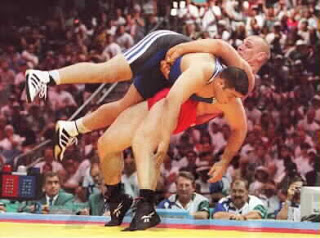
It’s likely that the wizards of warfare who confected the conflict in Georgia saw the current Russian military establishment much as Alexander Karelin’s early opponents saw him — big and intimidating, certainly, but also soft and, perhaps, a trifle stupid.
But it’s clear now that Russia can muster the means to assert control over its “near abroad,” a part of the world where Moscow remains formidable, and where we have no business meddling. That doesn’t mean the meddling will stop anytime soon, of course: There’s simply too much profit to be made by the War Lobby now that the public is being convinced that the Russians are once again on the march. And this may be the entire point of this bloody, cynical exercise.
It is the fate of Alexander Karelin’s ancient counterpart, Milo, that may foretell the end of Washington’s empire. Milo enjoyed a long and uniformly victorious career, but eventually Time, the subtle thief of youth, stealthily sapped his uncanny vitality.
As Milo became an older man, a dangerous dis-proportion developed between his vanity and his strength. He compulsively tested his strength by focusing it on opponents that couldn’t fight back — inanimate heavy objects and the like.
One day he found a farmer working with doomed persistence to split a large, gnarled tree stump with a wedge and a hammer. Eager to display his strength, Milo told the farmer who he was and asked if he could try to split the stump with bare hands. The farmer, delighted by the sudden appearance of the celebrity, invited Milo to grapple with the stump, and then ran off to fetch food.
Unfortunately, Milo’s confidence overmatched his strength. As he thrust his fingers into the stump, the wedge fell out, inextricably trapping his fingers. While the farmer tarried, a pack of wolves overwhelmed the aged wrestler, sadistically toying with him over the last, exquisitely painful hours of his life.
The imperial military is already trapped in Iraq and Afghanistan, and our rulers are doing their considerable best to entangle it in Iran. And now, rather than trying to get free of those snares, Washington is doing what it can to bring on the wolves.
A quick note —
Please forgive the tardiness of this installment. I spent the past several days sorting out some computer problems.
On sale now!
Dum spiro, pugno!
Content retrieved from: http://freedominourtime.blogspot.com/2008/08/back-in-ussa.html.


